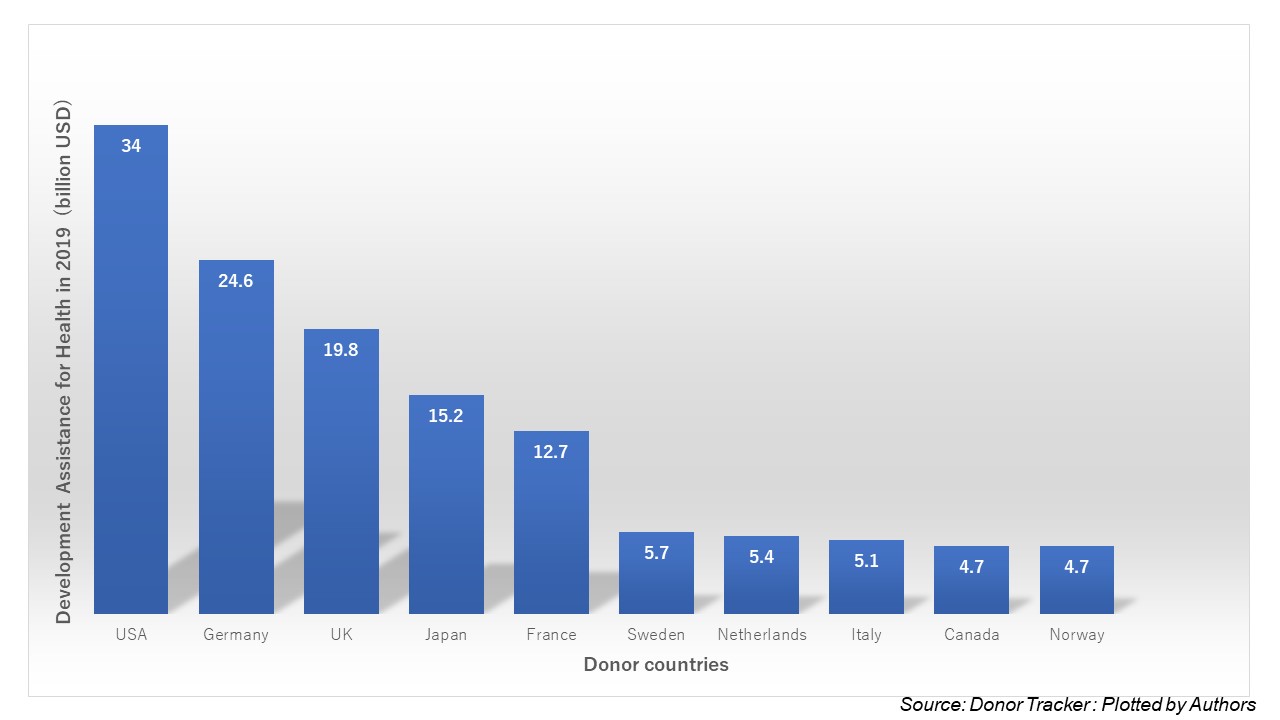Japan’s longest post-war administration led by Shinzo Abe came to an abrupt end on September 2020. This was on account of Abe’s health problems but in totality marks a period of seven years and eight months. The merits and demerits of Abe’s regime are being examined from diverse perspectives. However, one aspect is clear, Japan under Abe’s leadership has made a significant contribution to global health. Japan is now the 4th largest donor in the world, and the total amount of development assistance for health in 2019 being USD 15.2 billion following USA, Germany, and UK (Figure 1). Japan’s contribution to the Global Fund to Fight AIDS, Tuberculosis and Malaria (GFATM) has nearly doubled in the last decade : from USD 53.7 million in 2011 – 2015 to USD 94.7 million in 2016 – 2020.
Abe himself has taken a proactive stance on global health since he took office. When Abe took office in December 2012, two years before the MDGs target year, the debate on the global goals after the MDGs (later to be agreed upon as the SDGs) has already ensued. In September 2013 and 2015, Abe wrote an op-ed piece for the Lancet in which he outlined the importance of every country to accelerate their effort for attaining universal health coverage (UHC). He promoted UHC because the concept of UHC, “no one left behind,” has a high degree of affinity with the concept of human security that Japan has been promoting. Abe has confidence in Japan’s health care system, including the universal insurance system, which plays a crucial role in supporting the health of the Japanese people, who enjoy the longest life expectancy in the world.

Japan has a history of placing human security at the core of its international cooperation agenda for long. For example, the G8 Kyushu-Okinawa summit in 2000 focused on infectious diseases as an essential agenda item and contributed to establishing the GFATM. In the G8 Hokkaido Toyako summit in 2008, Japan stressed the importance of strengthening health systems as a complementary measure to vertical approaches to tackle infectious diseases and maternal and child health better.
Abe took up the global health security agenda more aggressively in the wake of the Ebola epidemic in West Africa. Although health issues have been discussed in the health sector at the health minister’s level in the past, Abe used the lens of UHC and health security at the G7 Ise-Shima Summit in May 2016. Abe administration stressed on reinforcing global health governance, including WHO reforms and accelerating UHC globally. The Abe administration stressed about the need for better coordination between the three layers of WHO – headquarters, regional office, and country office, and played a key role in launching the WHO Health Emergencies Programme. At Tokyo International Conference on African Development (TICAD) 6, in August 2016, the Abe administration again emphasized global health as one of the main agenda items. Discussions focused on health security and UHC for better preparedness and response to future public health emergencies. Most of the participants were African heads of state and government, and by proactively addressing health issues here too, he succeeded in pushing the global health debate to the level of heads of state and government.
Achieving UHC requires sustainable health financing, and this something difficult for health sector to achieve alone. Abe recognised this and focussed on the need for collaboration between the health and the financial sector. In late 2017, Abe launched the UHC Forum together with the WHO, World Bank, and several other international organizations. He also organised the G20 joint session of Finance and Health Ministers to coincide with the G20 Osaka summit in 2019. Both provided a significant opportunity to deepen mutual understanding between the finance and health sectors on sustainable health financing, which has tended to be discussed in each sector independently. Abe’s achievements have earned him a certain degree of international recognition, as he was the only head of state to speak at the closing of the UN general Assembly UHC high-level meeting in 2019.
COVID-19, is an opportunity to change global health governance, even more important now than during the Ebola epidemic. It remains to be seen which countries and organizations will lead the global health debate amid the rise of nationalism. Japan could continue to take a leadership role during these challenging times, building on Abe’s achievements during his nearly eight years as prime minister. As newly elected Prime Minister Yoshihide Suga first mentioned his contribution to global health at the UN General Assembly last September. We hope that the new government will continue to show and build on Japans leadership in the field of global health.
Competing interest
The authors declare no conflict of interest.
Author’s short biography
Haruka Sakamoto is an assistant professor at the Department of Health Policy and Management, Keio University, Japan.
Sarah Krull Abeis a staff scientist at the Center for Public Health Sciences, National Cancer Center, Japan.
Satoshi Ezoe is a project researcher at the Department of Global Health Policy, University of Tokyo, Japan
Handling Editor: Soumyadeep Bhaumik